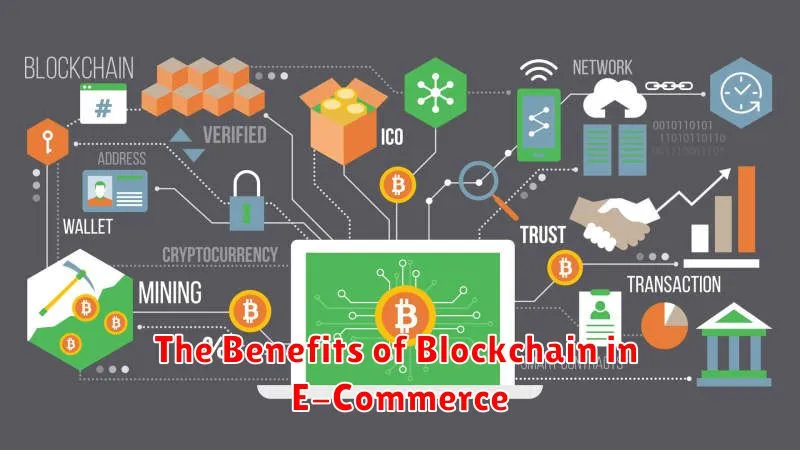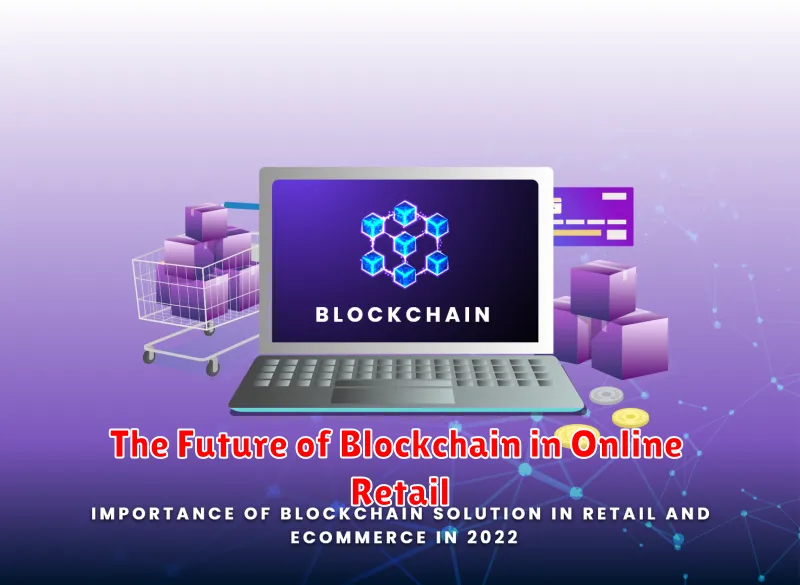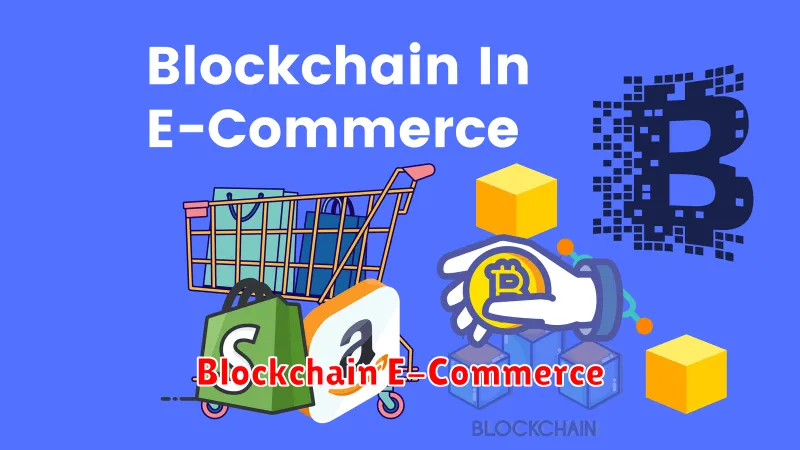E-commerce has undergone a dramatic transformation in recent years, with online shopping becoming the preferred choice for millions worldwide. This rapid evolution has been fueled by technological advancements, and one technology poised to revolutionize the industry is blockchain. Blockchain, the technology underpinning cryptocurrencies like Bitcoin, is a decentralized and secure ledger that records transactions in a transparent and immutable way. Its impact on e-commerce is already being felt, with businesses exploring its potential to enhance security, efficiency, and trust.
The potential of blockchain to reshape e-commerce is vast. It offers solutions to long-standing challenges, such as fraudulent transactions, supply chain transparency, and data security. By leveraging blockchain’s decentralized nature, e-commerce platforms can build trust and transparency, empowering both businesses and consumers. As we delve into the intricacies of blockchain technology and its applications, we will uncover how it is poised to redefine the future of online shopping.
The Benefits of Blockchain in E-Commerce

Blockchain technology is transforming the e-commerce landscape by offering a secure, transparent, and efficient way to conduct online transactions. The decentralized nature of blockchain eliminates the need for intermediaries, reducing costs and streamlining processes.
One of the key benefits of blockchain in e-commerce is enhanced security. Transactions are recorded on a distributed ledger, making them virtually tamper-proof. This eliminates the risk of fraud and data breaches, boosting consumer confidence and trust.
Another advantage is increased transparency. All transactions are publicly viewable on the blockchain, providing a clear audit trail and ensuring accountability. This fosters trust between buyers and sellers and creates a more level playing field.
Blockchain also enables faster and more efficient transactions. Smart contracts automate agreements, reducing processing time and eliminating the need for manual verification. This streamlines operations and allows for quicker delivery of goods and services.
Furthermore, blockchain facilitates cross-border payments. Its decentralized nature removes geographical barriers, making it easier for businesses to operate globally. This opens up new markets and expands reach.
The benefits of blockchain in e-commerce are numerous, offering a secure, transparent, and efficient platform for online transactions. As the technology continues to evolve, we can expect to see even more innovative applications that will revolutionize the way we shop and do business online.
How Smart Contracts Are Revolutionizing Online Transactions
Smart contracts are self-executing agreements stored on a blockchain, automating the execution of contractual terms. They are revolutionizing online transactions by eliminating the need for intermediaries, reducing transaction costs, and increasing transparency and security.
Smart contracts ensure the automatic execution of terms once predetermined conditions are met, removing the need for third-party intervention. This eliminates potential delays and disputes, streamlining the transaction process.
By removing intermediaries, smart contracts significantly reduce transaction costs associated with fees and administrative processes. This efficiency translates to lower costs for both businesses and consumers.
Every transaction recorded on a blockchain is immutable, ensuring complete transparency and accountability. Smart contracts enhance security by eliminating the risk of fraud or manipulation, as all terms are publicly verifiable.
In summary, smart contracts are a game-changer for online transactions. They are poised to transform the e-commerce landscape by fostering trust, efficiency, and transparency. This technology promises to revolutionize how businesses and individuals interact in the digital age.
The Role of Blockchain in Ensuring Data Security
Blockchain technology is revolutionizing the e-commerce industry, and one of its key advantages is its ability to enhance data security. The decentralized and immutable nature of blockchain creates a secure environment for storing and managing sensitive data.
Data Encryption and Integrity: Blockchain uses cryptographic techniques to encrypt data, making it highly difficult for unauthorized individuals to access or alter it. Each transaction is recorded on a distributed ledger, ensuring data integrity and preventing tampering.
Transparency and Traceability: Blockchain records all transactions transparently, allowing businesses and consumers to track data movement and verify its authenticity. This transparency fosters trust and accountability in the e-commerce ecosystem.
Reduced Risk of Data Breaches: Unlike centralized databases, blockchain stores data across a network of computers, making it highly resistant to data breaches. Even if one node is compromised, the remaining nodes maintain the integrity of the data.
Enhanced Privacy: Blockchain technology supports the creation of pseudonymous identities, allowing users to maintain a level of privacy while participating in e-commerce transactions. This can help protect sensitive personal information from unauthorized access.
In conclusion, blockchain plays a crucial role in ensuring data security in e-commerce by providing robust encryption, transparency, traceability, reduced breach risk, and enhanced privacy. These features are essential for building trust and confidence in online transactions, paving the way for a more secure and reliable future for e-commerce.
Case Studies: Successful Blockchain E-Commerce Platforms
The potential of blockchain technology to revolutionize e-commerce is undeniable. Beyond just hype, several platforms have already implemented blockchain solutions, delivering tangible benefits and demonstrating its transformative power. Here are some notable examples of successful blockchain e-commerce platforms:
OpenBazaar, a decentralized marketplace, empowers users to buy and sell goods without intermediaries. It leverages blockchain to provide a secure and transparent platform where transactions are directly between buyers and sellers, eliminating the need for traditional payment gateways or centralized control. This fosters a trustless environment, promoting free trade and empowering individuals.
VeChain, a blockchain platform specializing in supply chain management, has partnered with various businesses in the e-commerce sector. Its blockchain-based system enhances transparency and accountability, allowing consumers to track products from their origin to delivery. VeChain’s solutions have been particularly successful in the luxury goods market, enabling brands to combat counterfeiting and ensure authenticity.
Shopify, a leading e-commerce platform, has integrated blockchain technology into its ecosystem. Through partnerships with companies like Coinbase, Shopify enables merchants to accept cryptocurrency payments. This integration expands payment options, caters to a growing demand for digital currencies, and introduces a new level of financial accessibility.
These case studies demonstrate the real-world applications of blockchain in e-commerce. They highlight its ability to enhance security, transparency, efficiency, and user empowerment. As blockchain technology continues to evolve, we can expect further innovation and adoption within the e-commerce sector, ultimately shaping the future of online commerce.
Challenges in Adopting Blockchain in E-Commerce
While blockchain technology holds immense potential to revolutionize e-commerce, its adoption faces several significant challenges. One major hurdle is the lack of widespread understanding and awareness about blockchain’s capabilities and benefits. Many businesses and consumers remain unfamiliar with its concepts, hindering its adoption.
Another challenge is scalability. Current blockchain platforms struggle to handle the massive transaction volume required for large-scale e-commerce operations. This can lead to slow processing times and high transaction fees, making it less attractive for merchants and consumers.
Regulatory uncertainty is another significant concern. The lack of clear regulatory frameworks around blockchain technology creates ambiguity for businesses and can discourage investment.
Moreover, security concerns persist. While blockchain is generally considered secure, vulnerabilities exist, and malicious actors constantly seek ways to exploit them.
Finally, integration challenges arise when incorporating blockchain into existing e-commerce systems. Businesses must overcome technical obstacles and ensure seamless integration with their current infrastructure.
Despite these challenges, ongoing research and development efforts are addressing them, paving the way for wider adoption of blockchain in e-commerce.
The Future of Blockchain in Online Retail

Blockchain technology is rapidly transforming the online retail landscape, offering exciting possibilities for businesses and consumers alike. With its decentralized, secure, and transparent nature, blockchain has the potential to revolutionize various aspects of e-commerce, from supply chain management to customer loyalty programs.
One of the most significant impacts of blockchain in online retail is its ability to streamline and enhance supply chain management. By providing a shared, immutable ledger of transactions, blockchain can track products throughout their journey, from origin to delivery, ensuring transparency and accountability. This reduces the risk of counterfeiting, product tampering, and delays, ultimately boosting consumer trust and confidence.
Moreover, blockchain can empower businesses to offer more personalized and engaging customer experiences. By enabling secure data storage and sharing, it facilitates the creation of loyalty programs that reward customers for their interactions with brands. Blockchain can also be used to develop innovative payment systems that are faster, more secure, and more cost-effective than traditional methods.
Looking ahead, the future of blockchain in online retail is bright. As the technology continues to mature and gain wider adoption, we can expect to see even more transformative applications. From smart contracts that automate transactions to decentralized marketplaces that foster fair competition, blockchain holds the key to a more efficient, transparent, and customer-centric online retail ecosystem.

